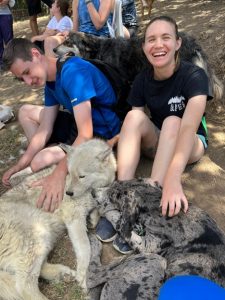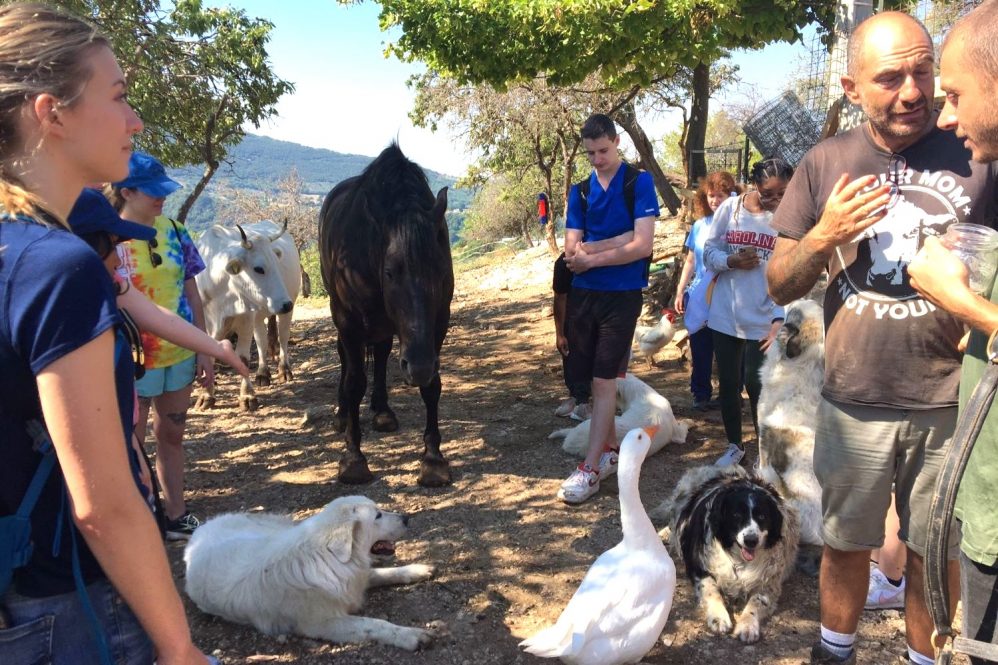How do you say veterinarian in Italian? Just ask Nolan Reilly ‘22 (CAHNR). The December graduate took full advantage of the opportunities available to him as an animal science major at UConn, gaining valuable hands-on knowledge both in Storrs and abroad.
Through a stroke of luck and a bit of wanderlust, Reilly put his studies and language skills to use through a unique program in one of Europe’s most beautiful cities. In the summer of 2022, Reilly participated in a pre-veterinary program called Doctors in Italy, based in Rome.

The group spent most of their days one of two visiting animal sanctuaries and learning about veterinary care in Italy. Veterinarians explained what to look for in check-ups for cows, sheep, dogs, goats, chickens, horses, and even fish. The vets also taught the students how to draw blood and give vaccinations to horses. They also met with an exotic animal veterinary who was an expert on lizards.
“None of us had done anything like that before,” Reilly says.
The experience gave Reilly and the other students insight into how agricultural practices in Italy differ from those in the U.S. For example, in Italy they do not de-horn or de-tail animals, which is common in the U.S.
“It was interesting to see differences in the cultural practices of animal science,” Reilly says.
While the program was based in Rome, the students, from multiple universities across the U.S., had the opportunity to travel outside of the city as part of group or individual outings on the weekends. Reilly went to Pompeii, Mount Vesuvius, and Vatican City during his time in Italy.
This experience allowed Reilly to compare his U.S.-based learning at UConn with an animal science international context.

In his classes and extracurricular activities at UConn, Reilly worked with a variety of animal populations, including cows, chickens, sheep, pigs, horses, and rats.
As an animal science major, Reilly participated in the Little International (“Little-I”) and trained a beef heifer named Moofasa for the show. This experience complemented training to suture small animals under anesthesia with supervision from a veterinarian during laboratory animal science course.
“There’s definitely a lot of hands-on experience in the animal science program at UConn, and it was exciting to translate that knowledge abroad,” Reilly says.
Reilly worked at the livestock barn for sheep and cows and at UConn’s Kellogg Dairy Center. He completed tasks like making sure the animals had food and clean water; gathered, prepared, and washed eggs; and cleaned the barn. He also got to assist in calving and was able to medicate and milk cows.
“I liked that the barns we have at UConn were really up-to-date and well-equipped with everything you need to learn,” Reilly says.
Reilly graduated in December with a degree in animal science and a minor in molecular and cell biology. He is now preparing for veterinary school where he plans on studying to become a small animal veterinarian. He is currently working at a local emergency vet service in Avon, Connecticut.
Reilly says his professors at UConn have continued their support during the application process.
“I had a really good experience,” Reilly says. “They are great people and great professors who care about you as a student. And it was amazing to have a chance to see the world while I was at it.”
Follow UConn CAHNR on social media



